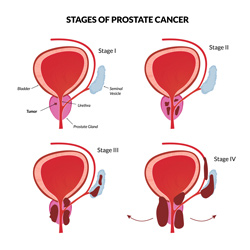
Prostate cancer is becoming a common part of our vocabulary as we are surrounded by awareness and fundraising efforts. The public attention on this illness is warranted, as it’s the most common cancer to affect Canadian men – One in seven men will be diagnosed in their lifetime.(1)
Prostate Cancer
The prostate is a part of the human body that we don’t think about unless it stops working properly. The gland itself is approximately the size of a walnut and sits just below the male bladder, in front of the rectum and surrounding the urethra. It’s an important part of the male reproductive system that adds nutrients and fluid to sperm.
Prostate growth is normally controlled almost entirely by testosterone from the testicles, but cancers can cause it to grow abnormally. While its possible to have abnormal growth or masses that aren’t cancerous, doctors take any malformation seriously as cancers can have serious repercussions. If untreated, prostate cancer can not only affect the reproductive system’s ability to function, but could spread and cause other very serious issues elsewhere in the body.
What Does Prostate Cancer Look Like – Signs and Symptoms
 Each case of prostate cancer has its own unique traits, but there are some symptoms that are often linked to the illness:
Each case of prostate cancer has its own unique traits, but there are some symptoms that are often linked to the illness:
- Difficulty urinating or pain while urinating
- Inability to urinate
- Urgent need to urinate or frequent urination
- Pain when ejaculating
- Blood in the urine or semen
Many people with prostate cancer also experience problems like numbness in the legs and feet, erectile dysfunction, or joint and bone pain.
Symptoms are often not present in the early stages, when the cancer can only be detected with tests. Chances of survival and treatment options are much better with early detection making it incredibly important for men to get screened for prostate cancer regularly.
Prostate Cancer Tests
Every year our medical science improves and our ability to diagnose and treat cancers improves. Many Canadians are aware of the more traditional DRE (Digital Rectal Exam) where a doctor manually feed for any malformations of the prostate gland.
While this is still an important standard test for prostate issues, doctors now also have the use of a blood test (Prostate Specific Antigen or PSA test) that looks for a specific hormone that can indicate prostate issues. The PSA test is a great early indicator that helps your doctor decide if more follow-up exams and tests are needed and can help start prostate treatment even sooner to provide better care with much improved survival chances.
It’s recommended that men above age 40 should get a PSA test to establish a baseline so that their medical team can compare future tests to their healthy levels of hormones. It’s recommended for men over age 50 to have an annual DRE as part of their yearly check-up with a doctor to help with early detection.

Treatment Options
If your doctor finds abnormalities in your prostate there are still many options to provide the level of care needed for each unique individual case. Remember that abnormal findings in a prostate exam might not even be cancerous, and your medical team is focused on providing excellent care that is also as minimally invasive as is reasonable.
Treatment could range from deciding to monitor the abnormal prostate to catch any changes, to more aggressive cancer treatments like medications, hormone therapy, chemotherapy, radiation, or surgery. The benefit of the wide array of treatments we have access to in Canada is that your doctors can find the perfect treatment for each patient’s needs.
Abnormal findings in a cancer screening test can be incredibly scary. Remember that your doctor and medical team are an excellent resource for answering questions and concerns that you may have about your prostate health. Starting the conversation with your medical team is a great way to learn more about your health.
Resources:
- “Prostate Cancer Canada.” Prostate Cancer Canada – Prostate Cancer Canada, Prostate Cancer Canada, www.prostatecancer.ca/.